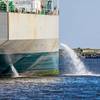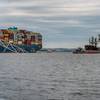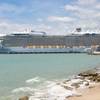German Marine Equipment Industries: Expansion to Protect World Market Position
German marine equipment suppliers are staying successful. Surveys of their industry association, the VDMA (German Engineering Federation), resulted in new record figures: in 2007, the sales achieved €11.9 billion with now 76,000 employees, making over 13.8% up on the previous year.
The export rate was 73%. The sector could thus maintain and expand its world leading role for high tech systems for shipbuilding. 58% of the German suppliers expect the order inflow in home trading still to increase in 2008, pushed by the still extraordinarily high capacity utilization of the German shipyards. But the effects of the global shipbuilding boom can mainly be seen in the foreign markets. The enterprises retain their outmost positive consideration of the export order book: 74% of the suppliers expect their foreign order inflow still to rise in 2008, despite the present extremely high level. The industry sector's capacity utilization is very high, even beyond the year 2010.
Compared to the previous year (32.8 %), the EU countries are playing a slightly larger role again in the export business during the present boom period. Yet, the dynamically growing export markets are to be found in Asia, headed by China. The Korean market remains constant.
The German Equipment Industries, as well as the shipping companies, have made the step into the international shipbuilding countries. By doing this, they had to face not only the competition of the European market participants but also to an increasing degree the competition from Asia. Two factors have been decisive for the success:
• Firstly, the technological leadership of the products had and has to be secured. To do this, the companies have continuously invested into the products' development. German enterprises are very active in the field of application-oriented research and development. It should be stated here that essential parts of the research are financed internally by the companies without any public financial support. This also includes companies participating in the development process and the later manufacturing of the products. This "internal" research is very efficient and enable a short time to market, a factor getting more and more important today. Furthermore, a strategy for maintaining the technological lead needs to be at hand, because the legal possibilities for protecting the own know-how in some upcoming markets are practically non-existent.
• Secondly, the flexibility of production and the usage of price advantages in low-wage countries enabled the catching up to the global price level. The German companies know that they have to orient their business towards international markets. Due to the constantly increasing demand for a local production share, especially organizational measures are necessary for the enterprises. Based on the fact that the main part of commercial seagoing vessels is built in Asia, the equipment industries can only maintain and expand their competitive position by securing their market shares in these countries. Selling shipbuilding equipment successfully means being present at the local customer! Here, the Asiatic competition in Korea and China has naturally their advantage of location which needs to be compensated. For this reason, many German equipment suppliers re-enforce there commitment in this region. Due to the international orientation and the innovation pace of this industrial branch, the performance required from the personnel is permanently increasing. During the past 25 years, the share of graduated engineers in the companies of the marine and offshore equipment industries was more then doubled and is approx. 20% with a clear upwards tendency. The industry's annual need for substitute manpower is more than 600 graduated engineers. Additionally to this, natural scientists of other faculties are required, who are employed in most medium-sized companies development of the know-how intense range of products and services.
Another strong boom takes place in the offshore oil and gas equipment industry. The raw material price explosions enforce globally the investments in technically challenging problem solving. Projects for the exploitation of crude oil and gas that have not been feasible before are now pushed by employing considerable financial resources and, by means of the latest development efforts, show first successes that already turn out to be profitable at present oil prices. This is the ideal market for the German equipment industries who are especially strong in niche markets. The environmental technology has turned into a growth market, as well. The German high tech industry must make the most of its technological edge in order to respond to the emerging energy shortage with top technical products with long service lives and smart ideas in the fiercely competitive global market. Examples are the development of the "clean ship" as well as the exploitation of raw materials at great water depths (e.g. Brazil) and energy generation with offshore wind power plants installed in deep waters. The increasing appreciation of lifecycle costs in companies and among the general public promises further benefits for German marine and offshore equipment makers, as in this area the R&D departments are looking well prepared into the future.
At the moment, a major bottleneck is the shortage of graduated engineers of all faculties, but also more and more skilled engineers and service personnel. The clear share of 7% new employments in 2007 could still be surpassed this year, if the manpower market for these industries would not be swept bare. For this reason, more and more companies take this challenge into their own hands: To an increasing extend in the shipbuilding industries, mainly composed by medium-sized companies, young people are employed directly after school within a system of dual studies. VDMA is involved in this field for many years with its campaign "Think- Ing" and will also promote on SMM 2008 in order to receive a sufficient number of suitable trainees for the industries.
The General Assembly of the VDMA division Marine and Offshore Equipment industries, taking place on the previous day of the SMM, the September 22, 2008, in Hamburg, will also accommodate these important items. The General Assembly of this year will be themed "We master the global growth — now set the course for competitive German marine and offshore equipment industries."
This motto shows that in parallel to success also the competitive pressure is growing, especially from Asia. Product piracy, high-valued EURO and astronomically raised raw material and energy costs are further challenges now and in future, additionally to the skilled personnel shortage already mentioned. High-ranking experts will attend the podium, among others the Marine Co-Ordinator of the Federal Government of Germany, the Parliamentary State Secretary Dagmar Wöhrl, is guest of honor on this assembly, and discuss these subjects and possible methods of resolution. The positive forecasts of the middle — and long-term development of global maritime trade and, thus, the shipbuilding industry must not hide the fact that also the next downward cycle is to come. The enterprises that have already experienced this cycle several times, have to be prepared for it. Various strategies for maintaining the own market position will be the primary focus and among these, innovation ability will be the most important — but also customer proximity will be of particular importance.
Equipment suppliers turn more and more into lifecycle partners of the ship owners. It's the strategy of many suppliers to accompany the owner during the entire life cycle of a ship as reliable and efficient partner, in order to secure the cost effectiveness, reliability and technical actuality of an expensive, complex and long-living transport system. Flexibility and promptness characterize most of the medium-sized suppliers here. It is with the same aim in mind that German suppliers are optimising the product related, globally flexible service networks and concluding forward-looking co-operation deals. For their shipyard customers, the suppliers are meeting a rising demand for extensive "package delivery solutions". These considerably reduce the number of supply partners a shipyard needs and also the costs involved in complex shipyard project management. The systems competence needed for this is constantly being honed by German suppliers. This also applies to increased "simultaneous engineering", which is part of the overall optimisation of shipbuilding processes now being sought by yards and suppliers.
(Reprinted from the September edition of Maritime Reporter)










